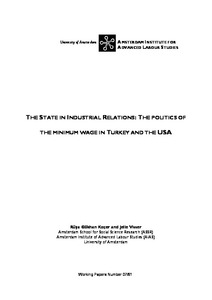The state in industrial relations: the politics of minimum wage in Turkey and the USA
"In this article the direct role of the state in industrial relations is scrutinized by focusing on the political basis of decisions regarding the minimum wage. We argue that in order to ensure stability and growth, any state must balance the interests of capital and labour when taking this kin...
| Main Author: | |
|---|---|
| Institution: | ETUI-European Trade Union Institute |
| Format: | TEXT |
| Language: | English |
| Published: |
Amsterdam
2007
AIAS |
| Subjects: | |
| Online Access: | https://www.labourline.org/KENTIKA-19291850124910190329-The-state-in-industrial-relati.htm |
| Summary: | "In this article the direct role of the state in industrial relations is scrutinized by focusing on the political basis of decisions regarding the minimum wage. We argue that in order to ensure stability and growth, any state must balance the interests of capital and labour when taking this kind of distributional decisions. This idea operationalized by using O’Connor’s concepts of accumulation and legitimation as the basis of an analytical model. Application of this model to Turkey and comparison with the US reveals that in Turkey governments take account of legitimacy concerns in their minimum wage decisions due to large number of workers directly dependent on minimum wage and weak collective bargaining institutions. In the US, despite similar industrial relations conditions, this tendency is not present, probably due to much smaller number of minimum wage earners and their weakness in the political process. However in the US too we observe that there is a difference between political parties and historical periods in the way in which the minimum wage is determined." |
|---|---|
| Physical Description: | 41 p. Digital |

